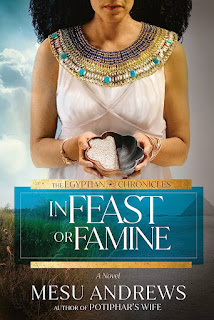Author: Mesu Andrews
Genre: Historical Fiction, Christian, Biblical Fiction, Romance
Publisher: Waterbrook
Release Date: May 9, 2023
Pages: 449
Source: Netgalley/Publisher in exchange for an honest review.
Synopsis: Thrust into an arranged marriage, the daughter of ancient Egypt’s high priest plays a pivotal role in Joseph’s biblical narrative in this powerful novel from the award-winning author of Potiphar’s Wife.
After four-year-old Asenath’s mother is murdered by Egypt’s foreign rulers, the child is raised to be a priestess by her overprotective father—high priest of Egypt’s sun god. For fifteen years, Asenath is sequestered in the upper levels of Ra’s temple, convinced it is her destiny to heal the land by becoming queen to the next Egyptianpharaoh. But when Egypt’s foreign king instead gives her as a bride to the newly appointed vizier—a Hebrew named Joseph—her entire world is shaken.
Beyond the walls of her tower, Asenath discovers treachery, deceit, and conspiracy that force her to redefine her destiny and weigh where her true loyalties lie. Can she still trust the gods of Egypt? Or is Elohim, the foreign God of her husband, the one who will heal her nation during the feast and famine to come?
My Review: In Feast or Famine is the sequel to Potiphar’s Wife. The story focuses on Joseph’s Egyptian wife, Asenath. Asenath is an Egyptian priestess who dreams of becoming Queen of Egypt. When the Pharaoh forces her to marry Joseph, who was once a Hebrew slave and rose to become the vizier of Egypt, Asenath feels her dreams have fallen apart. Asenath must learn to love her husband, Joseph. As Asenath tries to make marriage work, she learns more about her husband’s god, Elohim.
At first, I found Asenath a hard character to like. She is very selfish, childish, and whiny. She always threw tantrums when things didn't go her way. Therefore, I found her to be a very annoying character, and I felt sorry for Joseph because he had to marry her. Over time, Asenath gradually begins to change. She grows more mature and is wiser. I found her to be a good match for Joseph. I like how she becomes a woman of faith. Thus, Asenath really grew on me as a character.
Joseph was one of my favorite characters in Potiphar’s Wife. I liked his immense faith. Even though he did not want to marry Asenath, he married her because it was God’s will. Therefore, Joseph was very kind, compassionate, and loyal. I like how Joseph was human and had flaws. Nevertheless, Joseph always tried to do what was right. Even though Asenath was not his choice, I also liked how he was willing to make his marriage work. Thus, Joseph was very admirable.
Overall, this novel is about faith, marriage, and loyalty. I like all the supporting characters, and I loved revisiting some of them from Potiphar’s Wife. I did find the novel to be very slow at times. Nevertheless, I love how Mrs. Andrews made Ancient Egypt come alive! I love how there was romance, mystery, and political intrigue! I recommend this novel for fans of Dreaming in Egypt: The Story of Joseph and Asenath, Asenath: Vision of Egypt, and Joseph and Asenath!
Rating: 4 out of 5 stars


Comments
Post a Comment